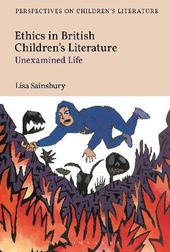
|
Ethics in British Children's Literature: Unexamined Life
Paperback / softback
Main Details
| Title |
Ethics in British Children's Literature: Unexamined Life
|
| Authors and Contributors |
By (author) Dr Lisa Sainsbury
|
| Physical Properties |
| Format:Paperback / softback | | Pages:240 | | Dimensions(mm): Height 234,Width 156 |
|
| Category/Genre | Literary studies - from c 1900 -
Children's literature studies - general |
|---|
| ISBN/Barcode |
9781474222822
|
| Classifications | Dewey:820.9928209045 |
|---|
| Audience | | General | | Tertiary Education (US: College) | | Professional & Vocational | |
|---|
|
Publishing Details |
| Publisher |
Bloomsbury Publishing PLC
|
| Imprint |
Bloomsbury Academic
|
| Publication Date |
26 February 2015 |
| Publication Country |
United Kingdom
|
Description
Featuring close readings of selected poetry, visual texts, short stories and novels published for children since 1945 from Naughty Amelia Jane to Watership Down, this is the first extensive study of the nature and form of ethical discourse in British children's literature. Ethics in British Children's Literature explores the extent to which contemporary writing for children might be considered philosophical, tackling ethical spheres relevant to and arising from books for young people, such as naughtiness, good and evil, family life, and environmental ethics. Rigorously engaging with influential moral philosophers, from Aristotle through Kant and Hegel, to Arno Leopold, Iris Murdoch, Mary Midgley, and Lars Svendsen, this book demonstrates the narrative strategies employed to engage young readers as moral agents.
Author Biography
Lisa Sainsbury is Director of the National Centre for Research in Children's Literature, University of Roehampton, UK.
ReviewsLisa Sainsbury has produced a stimulating and challenging text which analyses ethics and morality as central precepts of children's literature extant in contemporary writing. This book is essential to the student of children's literature * Jean Webb, Professor of International Children's Literature, University of Worcester, UK * Lisa Sainsbury has written a highly original study which illustrates brilliantly how children's literature contributes to children's moral, ethical and intellectual development. Spanning writers from Dante and Iris Murdoch to Enid Blyton and David Almond it shows how literature guides children to think about the world as it is and as it might be. * Kimberley Reynolds, Professor of Children's Literature, Newcastle University, UK * Lisa Sainsbury's book is a ground-breaking study that brings children's literature research to a new level of sophistication. This is interdisciplinarity at its very best, and a well-balanced alliance of theoretical awareness and broad knowledge of children's texts, classic and contemporary, popular and less-known. Sainsbury takes us on a journey through the most fundamental issues of children's literature. This book will doubtless become a milestone. * Maria Nikolajeva, Professor of Education, University of Cambridge, UK * With Lisa Sainsbury's Ethics in British Children's Literature the ethical turn in the humanities - which has been gathering momentum since the mid 1990s - has come back to the study of children's literature in full force. I write "come back" since early critical texts on children's literature almost always insist on the moral and ethical aspects of literature, its educational value. Over time, however, the Romantic view of the "innocent child" seems to have spilled over into literature for children, making it as innocent and innocuous as its young readers. It is true, however, that we have seen in the last decades a renewed interest in the moral and ethical qualities of children's literature has come to light. Unfortunately, much of it has been sketchy and lacking in depth, however. This is where Lisa Sainsbury's study comes in. Instead of relying on interprets and second-hand wisdom, she re-reads Hegel and Kant, and brings the study of children's literature up-to date with Plato and Spinoza. I am deeply impressed by her incisive and fresh readings of the classical philosophers, and vice versa, the way in which modern children's literature actually can engage with the fundamentals of ethical thinking. * Bjoern Sundmark, Associate Professor of Children's Literature, Malmoe University, Sweden * This is an important work which unites British children's literature with on-going debates in philosophy. Incorporating analyses of poetry, film, picturebooks and music as well as the novel, Sainsbury invites readers into a nuanced discussion of the moral and ethical questions which have informed the development of British children's literature over the last two centuries. * Lydia Kokkola, Professor of English and Education, Lulea University of Technology, Sweden * Lisa Sainsbury's focus is less on what children's literature teaches its young readers about being good than it is on how the texts she considers encourage their readers to think about what being good might mean and to become aware of the complexities inherent in our attempts to achieve goodness. Her carefully detailed analyses of a variety of British texts for children published since the middle of the last century uncover a fascinating range of ways in which aspects of narrative structure work to encourage ethical thoughtfulness in their young readers. Ethics in British Children's Literature is an important contribution to our understanding of the potentially positive and liberating aspects of the impulse to teach in writing for young people, an impulse all too often thoughtlessly dismissed as old-fashioned or merely and always repressive. * Perry Nodelman, Professor Emeritus of Children's Literature, University of Winnipeg, Canada * Sainsbury's book takes seriously the opportunity to show how childrens books and philosophy each can illuminate and enrich the study of the other. Sainsbury's extensive knowledge of children's boks makes all the difference in her ability to create an appreciation for the relevance and usefulness of continental philosophy to the reading of British children's books. Sainbury's examination makes it clear how a tradition of children's books in England has benefitted from and extend philosophical discussions of moral behavior and perceptions of the child. This book is truly of value to student s of both British children's literature and continental philosophy. -- Mike Cadden * Children's Literature Association Quarterly *
|